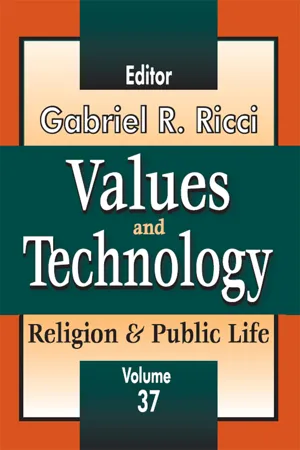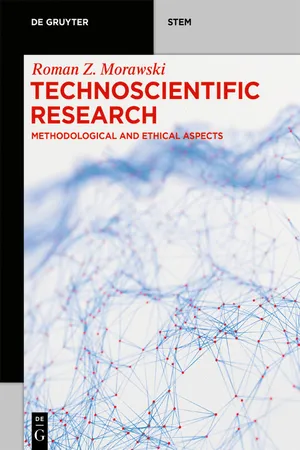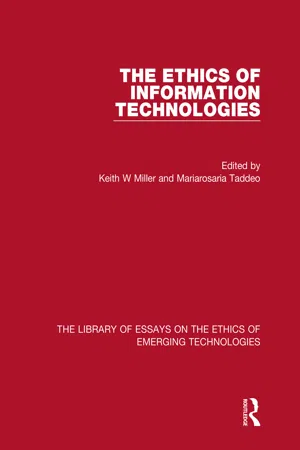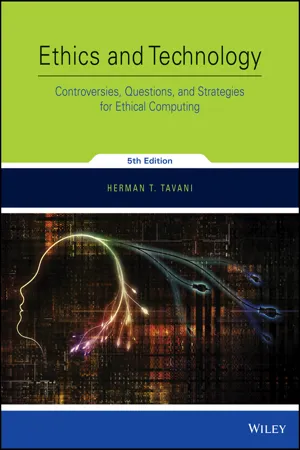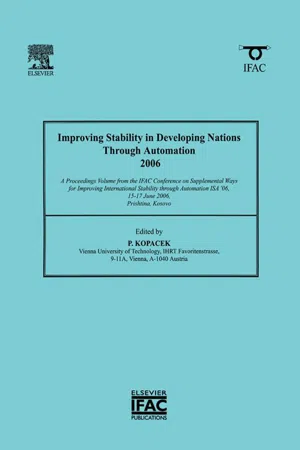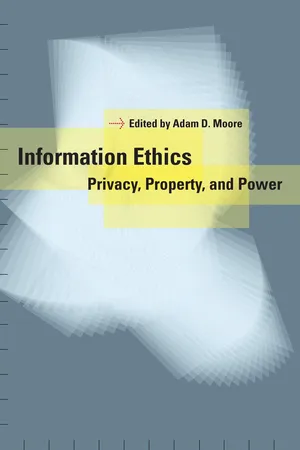Computer Science
Ethical Issues in Computer Science
Ethical issues in computer science refer to the moral dilemmas that arise from the use of technology. These issues include privacy concerns, cyberbullying, intellectual property rights, and the impact of technology on society. It is important for computer scientists to consider the ethical implications of their work and strive to create technology that benefits society as a whole.
Written by Perlego with AI-assistance
Related key terms
1 of 5
11 Key excerpts on "Ethical Issues in Computer Science"
- eBook - PDF
- Jocelyn O. Padallan(Author)
- 2019(Publication Date)
- Arcler Press(Publisher)
In the field of IT and computer systems; also, there have been various ethical issues that concern individuals and their personal lives. In this chapter, the readers get an insight various such issues and get to understand the flaw in the computing systems. 4.1. INTRODUCTION The world that the people live in is ever evolving and ever-changing in terms of technological innovations and developments. In such a world, it is bound to be that the subject of ethical issues is brought up from time to time. This subject requires great concern and seeks the support of people in the form of best efforts they can put in to resolve the issues with ethics (Figure 4.1). Figure 4.1: Ethics form an integral part of computer systems. Ethical Issues in the Information and Computer Sector 89 Source:https://cdn.pixabay.com/photo/2017/03/02/07/32/eth-ics–2110589_960_720.jpg Among the most discussed issues regarding the IT industry, the ones related to information communication technologies, it has generally come up on the top. The uncontrolled expansion of the ICT and its overwhelming use that support the technology structure across industries have made some notable impacts on the social existence of people which makes it a subject that gets enough attention from the ethical point of view. The problems regarding this have been discussed in such a manner that the confusion regarding it has had varied impacts in the society. The various issues that the use of ICT gives birth to are a breach of privacy of a person or an organization, taking over the rights of property, pricking the various social rights of the people, and the accountability that sets up due to the situations that take place after the use of ICTs. The issues that have been mentioned above have given rise to other related problems such as unemployment, improper working conditions and degrading a person’s individuality. - eBook - ePub
Values and Technology
Religion and Public Life
- Gabriel R. Ricci, James Burk(Authors)
- 2017(Publication Date)
- Routledge(Publisher)
However, it is always possible to find the right moment to attract students’ attention in the desired direction. Students should become familiar with the concept of computer ethics defined as “the analysis of the nature and social impact of computer technology and the corresponding formulation and justification” [20]. Computing courses which incorporate ethical issues and have been thought by the author are as follows: Introduction to Computer Applications, Computer Science I and II, Information Systems, Systems Analysis and Design, Database Systems, Database Systems Development and Applications, and Readings and Projects in Computing. Over the last few years, there has been a wonderful trend in publishing—an increase in the offering of computing of textbooks that contain ethics-related chapters in addition to specific computing topics. The courses mentioned above offer limited opportunities to teach ethical concepts and principles because of the wide range of topics that have to be covered in the given period of time. Today, most publishing companies offer a variety of textbooks which are appropriate for use in different disciplines, which include chapters discussing social and ethical issues, and which are related to multilateral computer aspects [ 1, 7, 11, 14 - 15, 23 - 24, 26 ]. Very often, the nature of the material taught in computing courses allows the instructor to shift the focus to ethical and moral issues related to software development. When students start designing and running their own computer programs, they are advised to consider whether the source code is understandable to other users. Students also need to think about the social impact of their software products. Initiating discussions about copyright concepts is also appropriate - eBook - PDF
Technoscientific Research
Methodological and Ethical Aspects
- Roman Z. Morawski(Author)
- 2019(Publication Date)
- De Gruyter(Publisher)
The most frequently addressed issues of computer ethics are: protection of data confidentiality, protection of intellectual prop- erty, fair access to information and reliability of operations performed on information. Both individual computers and computer networks (local, regional and global) can be used to commit common crimes, to violate privacy or to conduct espionage. They can cause damage to individuals or institutions if the software does not work as expected, because of a programmer’s error or his deliberate action; they can perform sophisticated logical and mathematical operations whose correctness cannot be checked by anybody. Computer ethics is to determine to what extent and in what sit- uations we can trust computer systems, and what restrictions should be imposed on their use. IT means can be used for performing illegal operations, being serious ethi- cal violations, which are, however, neither specific to the scientific community nor very frequent among its members; therefore, they will not be discussed here. The spectrum of IT-related ethical issues is systematically expanding with the de- velopment of IT, and it is increasingly more and more identified with the spectrum of ethical issue related to the infosphere. This is because the social impact of the IT de- velopment is becoming more and more recognised, and – consequently – ethical de- mands regarding the “ecological” management of the infosphere are more and more explicitly articulated. The relevant public debates focus on such issues as: – the IT-induced evolution of the social context in which ethical problems, unre- lated to technology, appear and are solved; – the increase in the objective scope and subjective sense of anonymity of opera- tions performed on information; – the fuzzification of responsibility and increased sense of impunity for unethical processing of information. - eBook - ePub
- Keith W Miller, Mariarosaria Taddeo(Authors)
- 2020(Publication Date)
- Routledge(Publisher)
Let us next examine some areas in which philosophers can help to clarify some existing and future conceptual confusions associated with moral issues in computing. Consider some of the confusion that currently exists with regard to exactly what is an ethical issue in computing. Birrer (1998) notes that it has become trendy to extend the term ‘computer ethics’ to apply to almost anything that for decades used to be referred to by terms such as ‘social issues in computing.’ Birrer goes on to point out that while many of the issues considered in this stretched sense of computer ethics may even be normative, they are not necessarily ethical in nature. Unfortunately, this important distinction is frequently glossed over, or in many cases overlooked altogether, in much of the computer ethics literature. 15 I have argued elsewhere (Tavani 1999b) that philosophers can play an important role in helping to sort out genuine ethical issues from those issues that are essentially sociological and descriptive in nature. If someone approaching the field of computer ethics for the first time were to examine much of the current literature that passes for ‘computer ethics’ and ‘Cyberethics,’ that person might get a very distorted picture of the field. For one thing, at least some of the books now being published with the expressions ‘computer ethics’ or ‘Cyberethics’ in their titles have little or nothing to do with ethics. For example, Willard’s The Cyberethics Reader (1997), despite its title, does not address ethical issues at all. That particular text focuses primarily on scenarios having to do with polite behavior or etiquette on the internet (i.e., what some referred to as ‘Netiquette’) - eBook - PDF
- G.Michael Schneider, Judith Gersting(Authors)
- 2018(Publication Date)
- Cengage Learning EMEA(Publisher)
For example, you have read about the mathematics of algorithmic efficiency (Chapter 3), the hardware implementation of computer systems (Chapters 4 and 5), computer networks (Chapter 7), and software development (Chapters 9 and 10). However, in this chapter, we focus on the human issues lurking behind these technical details. We can’t provide a comprehensive list of such issues; such a list would be way too long, and it is growing daily. Instead, we introduce skills that will help you to think and reason carefully when mak-ing personal decisions about computing. This chapter also discusses impor-tant societal issues related to information technology and personal privacy and points you toward resources to help you explore these issues in greater detail. Making critical decisions about computing technology is unavoid-able. Increasingly, our society is being driven by the access to and control of Copyright 2019 Cengage Learning. All Rights Reserved. May not be copied, scanned, or duplicated, in whole or in part. Due to electronic rights, some third party content may be suppressed from the eBook and/or eChapter(s). Editorial review has deemed that any suppressed content does not materially affect the overall learning experience. Cengage Learning reserves the right to remove additional content at any time if subsequent rights restrictions require it. 793 information. As citizens of our communities, our country, and the world, we want our decisions to be well informed and well reasoned. Whenever humans make decisions about things they value, there are con-flicts and trade-offs. The field of ethics , the study of moral philosophy, has a long history of looking at how to identify and resolve such conflicts, and we will borrow from several classical theories of ethics. In this chapter, we pres-ent a number of case studies built around complex ethical issues related to computing and information. - eBook - ePub
Edutech Enabled Teaching
Challenges and Opportunities
- Manpreet Singh Manna, Balamurugan Balusamy, Kiran Sood, Naveen Chilamkurti, Ignisha Rajathi George, Manpreet Singh Manna, Balamurugan Balusamy, Kiran Sood, Naveen Chilamkurti, Ignisha Rajathi George(Authors)
- 2022(Publication Date)
- Chapman and Hall/CRC(Publisher)
Sniderman, 2020 ).Ethics are the norms in any particular department according to the higher authorities that are to be followed by all people belonging to that organization. Professional ethics are principles that set the expectations for behavior for all members of an organization (Bhasin, 2020 ).A broad class of websites and services that allow connecting with people of similar interest through social networking sites such as Facebook, Instagram, and many more in the acceptable use of policies, which are set by a network administrator or by school authorities for the users of such technologies for safety and security concerns to avoid any sort of bad consequences in future (Farnese, 2012 ).4.3 Ethical Issues in Technology
While using online websites for different purposes such as online shopping, indulging in social media, etc., companies sell personal data of customers to make unlawful deals with the third party against the norms of their own companies. As cyber use increases, knowing if your online data is protected becomes more difficult and confusing (Watters, 2021 ).4.4 Why Digital Ethics Are Important
It is mandatory as it depicts the inner persona of the person behind the screen with the intentions receiver is getting after receiving the message (Davis, 2021 ).The following sections outline the ethical issues of most concern for individuals.4.4.1 Confidentiality
Confidentiality permits only authorized users to access sensitive and protected data in computer systems. Specific procedures protect data from malicious invaders while ensuring confidentiality (Techopedia, 2021 ). It has a particular impact on clients, encouraging them to build trust because the duty of secrecy is critical in fostering positive perception in public dealing (Widmaier, 2016 - eBook - PDF
- Suraj Singh Panwar(Author)
- 2019(Publication Date)
- Arcler Press(Publisher)
THE ETHICAL AND LEGAL IMPLICATIONS OF A COMPUTER INFORMATION SYSTEM 9 LEARNING OBJECTIVES: In this chapter, you will learn about: • The ethical and legal inferences of a computer information system; • History of ethics in terms of information system; • The notion of code of ethics and digital rights management; • Digital Millennium Copyright Act. CHAPTER • Copyright • First generation computers • Second generation computers • Creative Commons • Millennium rights • Digital rights management • Ethics • Techno-socio-economic • Aristotelian theory • Intellectual property rights KEYWORDS Introduction to Computer Information Systems 162 9.1. INTRODUCTION The importance of information technology (IT) has caused the dependence on computers as important methods that has penetrated all of society, containing the education field and its institutions of higher learning. Though, the speed at which change in technology has happen it seems to have been far longer than far quicker than thought of their effect upon society or cultural norms and principles or the development of values leading the use of the technology. Additionally, the new technology has caused new ethical and legal questions to come in front, and that is IT shows skill and gear of such control and of popularity, so some people put their thought that it makes exclusive moral claim and start special ideas about right and wrong. The using and storing the IT of various types has come into focus many ethical concerns, many of them have put attention on and been exclusive to the Internet and the capability to attract people, contains those on college campuses, to the world. - eBook - PDF
Ethics and Technology
Controversies, Questions, and Strategies for Ethical Computing
- Herman T. Tavani(Author)
- 2016(Publication Date)
- Wiley(Publisher)
We then briefly considered whether any cyberethics issues are unique or special in a nontrivial sense. We next examined three different perspectives on cyberethics, showing how computer scientists, philosophers, and social scientists each tend to view the field and approach the issues that comprise it. Within that discussion, we also examined some ways in which embedded values and biases affecting cybertechnology can be disclosed and thus made explicit. Finally, we introduced a comprehensive methodo- logical scheme that incorporates the expertise of computer scientists, philosophers, and social scientists who work in the field of cyberethics. Discussion Questions ◀ 23 ▶ REVIEW QUESTIONS 1. What, exactly, is cyberethics? How is it different from and similar to computer ethics, information ethics, and Internet ethics? 2. What is meant by the term cybertechnology? How is it similar to and different from computer technology? 3. Describe in detail each of the “four phases” involving the evolution of cybertechnology. What are the key technological developments in each phase? 4. Describe in detail each of the four phases comprising the development of cyberethics as a field of applied ethics. What are the key ethical issues that arise in each phase? 5. Why does Walter Maner believe that at least some cyberethics issues are unique? What arguments does he provide to support his view? 6. Why is it important to distinguish between unique technological features and unique ethical issues when evaluating the question, Are cyberethics issues unique? 7. What alternative strategy does James Moor use to analyze the question whether cyberethics issues are unique ethical issues? 8. Why does Moor believe that cybertechnology poses special problems for identifying and analyzing ethical issues? 9. Explain what Moor means by the expression “logical malleability,” and why he believes that this technologi- cal feature of computers is significant. - Peter Kopacek(Author)
- 2007(Publication Date)
- Elsevier Science(Publisher)
Part 4 Privacy, Security and Ethical Issues Current Ethical Scruples Concerning Information Engineering Tibor Vámos [email protected] Computer and Automation Research Institute, Hungarian Academy of Sciences H-1111 Budapest, Lágymányosi u. 11., Hungary Abstract In the irresistible emergence of e-society the individual is represented by his/her electronic identity. The theoretical and practical pros and cons of electronic identity are treated, the harmonization and contradictions of privacy and security interests, and their relationship to the principles of liberty and solidarity, individual and society. The issues of democratic control and influence to further developments of democracy are discussed with a special focus on the ethical duties and possible actions of the engineering community, with some references to the dramatic events of global terrorism, extreme fundamentalism and to the local efforts of Hungarian Information technology. Keywords Social behavioural sciences social impact linguistic support 1 INTRODUCTION Through out the ages, no responsible professional activity has existed without scruples. Though, in our age unscrupulous behaviour is, in technologically advanced countries, less of a danger than it used to be earlier, even in the 20 th century. The other addendum is the requisite of the concept of professional responsibility; the quality of being scrupulous, scrupulous in his/her science, personal competence and especially in considering the consequences of his/her results. The characteristic difference in our age is the ubiquity of science and science-originated technology in every relation of human life and the special role of information, disseminated and transmitted globally, as the fundamental vehicle in human action and society organization- eBook - PDF
Business Ethics
A Contemporary Approach
- Gael McDonald(Author)
- 2014(Publication Date)
- Cambridge University Press(Publisher)
S o c i e t a l e t h i c a l i s s u e s i n IT The third dimension of ethical issues in information technology relates to those that do not just affect business organisations or individuals, but society as a whole and, as a conse-quence, tend to be broader in nature. Key societal issues are covered in this section. Freedom of information Inherent in the principle of freedom of information is the ability to access and distribute infor-mation without impediment. This concept is obviously held in high regard by the media. However, ownership of and control over information has become an important source of political power in society (Brey 2000 ). Free speech is the ability to communicate without restriction. This is considered an essential right of a functioning democratic society and as the philosopher, John Stuart Mill, argued – truth is much more likely to spring from a free flow of ideas and contested debate (Johnson 2000 ). Information technology can greatly assist with the dissemination and critique of alternative views, and it has been suggested that was the case doctrine of fair use – allows copying in circumstances that are deemed to be important or will have limited impact. Copyright, therefore, is not deemed to be infringed in certain circumstances where small sections of text are used in the context of news, student work, teaching and research, and publications. freedom of information – the ability to access and distribute information without impediment. free speech – the ability to communicate without restriction. Chapter 3 Ethics in information technology 93 with the Arab Spring where technology was used to garner national and international support (Short 2012 ). But what happens when this information dissemination is restricted and the dis-senting voices silenced? In an interesting duality, some argue it could be an efficient tool for enabling autocratic or totalitarian behaviour (Gorniak-Kocikowska 2007 ). - Available until 23 Dec |Learn more
Information Ethics
Privacy, Property, and Power
- Adam Daniel Moore(Author)
- 2012(Publication Date)
- University of Washington Press(Publisher)
Needless to say, developing answers to these questions is philosophically challenging. This anthology was put together so that a number of important articles centering on the normative issues surrounding information control—in the broadest sense—could be found in one work. As we move further into the information age, which is marked by the shift from an industrial economy to an information-based economy, clarity is needed at the philosophical level so that morally justified policies and institutions can be adopted.Information ethics is related to, but not the same as, computer ethics or ethics and information technology. Computer ethics includes topics such as value sensitive design and computers as social actors. The former considers the ethical dimensions of values imposed on users via the user interface while the latter examines the ways in which computers play social roles. Neither of these issues is directly related to information ethics. Moreover, there are areas of information ethics that don't properly fall into the domain of computer ethics or ethics and information technology. For example, when government agents search an apartment, computers and information technology may play no role in the search or the ethical issues surrounding the event.Before providing a summary of the articles included in this volume, we would like to give a brief overview of the different domains of inquiry that make up information ethics: applied ethics, intellectual property, privacy, free speech, and societal control of information. Each of these specialized areas of study has its own historical context. We will take them up in turn.Moral Theory and Applied EthicsAlthough the readings in Part I
Index pages curate the most relevant extracts from our library of academic textbooks. They’ve been created using an in-house natural language model (NLM), each adding context and meaning to key research topics.

